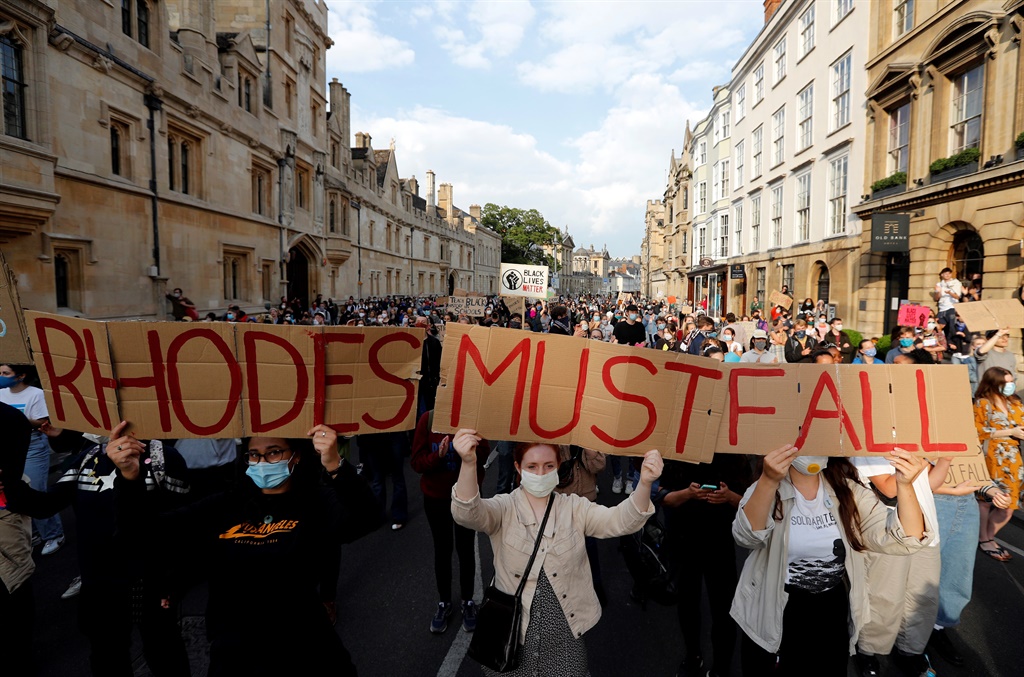


Demonstrators hold placards during a protest arranged by the ‘Rhodes Must Fall’ campaign, calling for the removal of a statue of British businessman and imperialist Cecil John Rhodes, from outside Oriel College at the University of Oxford in Oxford, west of London.
A statue to worldwide scout movement founder Robert Baden-Powell on Thursday became the latest historical monument to face removal as Britain’s colonial past confronted a wave of anti-racism protests.
Local council leaders said they would take down the life-sized statue in the English south coast town of Poole to “minimise the risk of any public disorder”.
Activists had highlighted Baden-Powell’s sympathies to Nazism and the Hitler youth programme.
The decision came in the wake of weekend demonstrations that saw the toppling of a statue to the 17th century slave trader Edward Colston in the southwestern port of Bristol.
A statue of fellow slave trader Robert Milligan was removed in London’s Canary Wharf banking district after Prime Minister Boris Johnson acknowledged public anger on Tuesday.
Johnson said the “depth of emotions” triggered by the death in US police custody of the unarmed African American George Floyd “can’t be ignored”.
Local authorities across Britain are now looking to either rename or replace monuments that have upset and infuriated the black and minority ethnic communities for generations.
READ | UK confronts colonial past with statue protests
The University of Liverpool said it would rename a building named after former prime minister William Gladstone because of his links to the slave trade.
And Edinburgh prepared to attach a plaque to a 150-foot (45-metre) monument to Henry Dundas that explained the Scottish politician’s ties to the African slave trade.
The plaque intended to honour the “memory of the more than half a million Africans whose enslavement was a consequence of Henry Dundas’s actions”, the city council said.
The newly-formed Democratic Football Lads Alliance said it will be “protecting” monuments this weekend and urged “no women or children (to) attend” because the group could not guarantee they would be safe.
Anti-European populist Nigel Farage caused outrage by comparing the toppling of Colston statue to the Taliban’s destruction of ancient Buddhist statues in Afghanistan in 2001.
“What we saw on the weekend was the most appalling example of mob rule,” he told ITV television.
A London radio station where he had hosted a talk show said its contract with Farage’s was up “very shortly” and it was terminating it with immediate effect.
Meanwhile a few dozen mostly white and elderly protesters rallied around Baden-Powell’s statue in a Bournemouth harbour to honour his legacy.
Bournemouth, Christchurch and Poole Council deputy leader Mark Howell said the British Army hero “did an enormous amount of good” and his statue deserved to remain on display somewhere in the city.
Its planned removal on Thursday had been delayed because its “foundations are deeper than originally envisaged”, he added.
“We will be providing 24-hour security until it is either removed or the threat diminishes,” he said.
Britain’s history is filled with figures who ruled over a global empire that waged colonial wars and pursued policies that resulted in millions of deaths across the world.
Bristol’s Colston was a leading figure in a royal slave trading company that sold around 100 000 west Africans in the Caribbean and the Americas after first branding its initials on their chests.
But his name remains attached to streets and buildings that honour the money he poured into local hospitals and schools for the poor.
Bristol authorities fished his statue out of the local harbour Thursday – dumped there with a great cheer by protesters on scenes played on TV screens around the world – in order to place it in a museum.
Mayor Marvin Rees also announced a commission to research Bristol’s past.
“The only way we can work together on our future is by learning the truth of our beginnings, embracing the facts, and sharing those stories with others,” he said.
London Mayor Sadiq Khan announced his own a review of landmarks to see if they could better reflect the city’s diversity.

